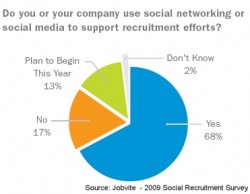 ERE’s first Social Recruiting Summit gets underway Monday, appropriately enough, at Google world headquarters in the heart of Silicon Valley. That it’s a sold-out conference should be no surprise, considering the virtual stampede of recruiters to social media.
ERE’s first Social Recruiting Summit gets underway Monday, appropriately enough, at Google world headquarters in the heart of Silicon Valley. That it’s a sold-out conference should be no surprise, considering the virtual stampede of recruiters to social media.
Surveys in just the last month from Jobvite, Arbita, LinkedIn and others show the fascination recruiters have with social media. The Jobvite report found 72 percent of the surveyed recruiters will invest more in social networks this year. Contrast that with the 26 percent who expect to spend more on job boards.
The Arbita survey, coming at the question from a somewhat different angle, says 73 percent expect to spend the same or less on search engine marketing and social media; 93 percent of the respondents to that survey say they’ll spend the same or less on job boards.
 Both show a legion of recruiters experimenting with social media. Referrals are still the recruiting gold standard, but the survey evidences an excitement with the potential that social networks hold, even if recruiters are still unsure how best to use them and how effective they will be in the long run.
Both show a legion of recruiters experimenting with social media. Referrals are still the recruiting gold standard, but the survey evidences an excitement with the potential that social networks hold, even if recruiters are still unsure how best to use them and how effective they will be in the long run.
For instance, Arbita found half the surveyed companies have no effective strategy for finding candidates on networks such as LinkedIn and Facebook. The company asked about strategies for sourcing candidates through their blogs and 85 percent said they have nothing effective.
No wonder the Social Recruiting Summit filled up. No wonder that so many recruiters stepped up to lead “Unconference” discussions, not only on tactics, but on how social media recruiting is likely to evolve over the next few years and how it fits into the overall corporate recruiting portfolio.
The picture that emerges from the pre-conference discussions on ERE and Twitter, and from the Arbita and Jobvite reports, is one of recruiter anticipation that pretty clearly says, “We’re not sure where there this train is heading, but we’re getting on.”
The Arbita survey has recruiters admitting that while metrics to support their marketing decisions are important, 62 percent aren’t happy with the quality of the data. Remarkably, 39 percent of the respondents don’t even see metrics and analytics as an important part of recruitment strategy.
That startling result lead Don Ramer, founder and CEO of Arbita, to rail in the report that, “Two generations after the invention of the relational database –- of Lotus –- we have 39 percent of the people who are responsible for staffing saying metrics and analytics are not an important part of their strategy.”
The Jobvite report at least had recruiters explaining their rationale for using social media: 77 percent use the networks to reach passive job seekers; 74 percent because of the lower cost, and; 72 percent to find candidates with hard to find skills or experience.
While Jobvite’s survey didn’t delve into strategic decision making and metrics, the respondents at least had a basis for making those judgments. Two-thirds of them had made hires through an online social network.
It may be foolish to dismiss the role of metrics and analytics in deciding where to focus your recruiting effort. But jumping on to the social media train is hardly foolish, even if the analytics aren’t there, yet, to be able to say with certainy whether the phenomenon will deliver the sort of results we want.
Peter Weddle, the well known recruiting publisher and consultant, has a contrarian view of the social media landrush. He blogged a few weeks ago that, “There is a great SCAM being perpetrated in the recruiting profession today. Call it “social capabilities ahead of the market.”
Facebook, LinkedIn, Twitter, he wrote, aren’t ready for prime time: “These sites may be effective recruiting tools in 2014, but today they aren’t even close. To put it another way, they are social capabilities that are way ahead of the market, if the market you’re after is the one for talent.”
His evidence, though arguable as to its meaning, is worth considering. The short version of it is that people, especially the millenials, those denizens of social media, still look for jobs on job boards. And well they should. To twist a phrase from bank robber Willy Sutton, job boards are where the jobs are.
Social media, however, is where the world is. The only reason to post a resume on Monster is to find a job. Posting to LinkedIn or building a Facebook page or Tweeting is done by millions for purely social and business reasons, only some of which is directly motivated by job hunting.
Neither the Arbita nor Jobvite survey presages the imminent demise of the job board. Crystal ball gazers have been predicting that for years and they’re all still here and more seem to be coming every day.
Instead, what the surveys suggest and the interest in the Social Recruiting Summit reflects is that social media is becoming a part of recruiting’s toolbox, even if we aren’t sure how it will fit into a comprehensive strategy.